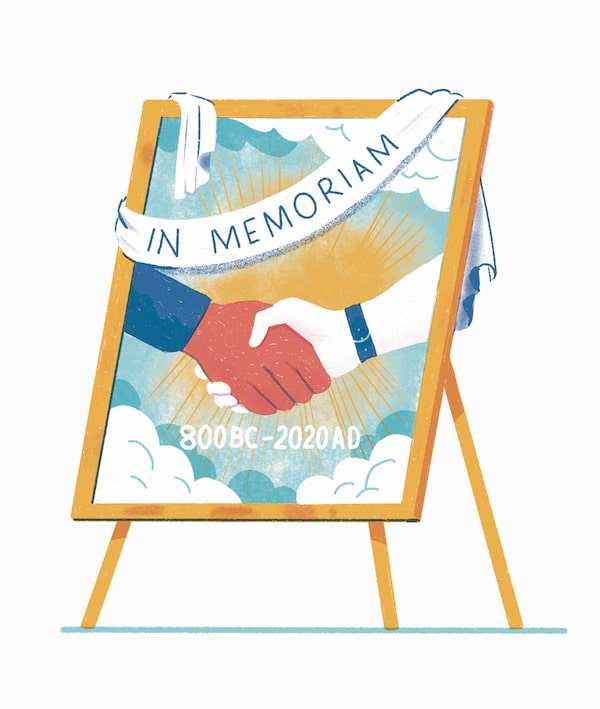
Illustration by Drew Shannon
How many people have you shaken hands with over the course of your life? It’s one of our oldest and most revered customs. Two people clasping hands is a cornerstone of civilization, of human interaction and social order. It’s a gesture that predates recorded history. With the rise of COVID-19, however, the handshake may be done for. We’re going to miss it.
We’ve been encouraging each other to “put ‘er there” for a long time. Some scholars trace the handshake back to ancient Rome, circa eighth century BC. Others date it back even farther – and place it elsewhere – to 12th century BC and ancient Greece. Like fire and the wheel, no one is certain when or where the handshake originated, but we do know a bit about why.
In ancient times, when you greeted someone by extending your hand, you showed that you were not armed. This is why you shake hands with your right hand, which is the hand you’d likely use to wield the dagger concealed in your toga.
I also like the theory that the actual shaking of the hand (not just clasping it); was intended to shake loose any weapons you may be hiding in your sleeves.
Most of these theories are just that – theories. Evidence is scant, it’s pretty murky, especially the farther back you go. The true origins of the handshake, it seems, are lost in the mists of time.
The “I come in peace” element, however, elevated the handshake to something more, thus increasing its social and cultural stature. It wasn’t just a greeting, it was a gesture of faith and trust, of peace and non-aggression, often between two people who don’t know each other. A thousand years ago, such a gesture meant something. You could never know the intentions of the person approaching you on the road, so to see a hand extended, which meant this stranger’s sword was in its scabbard, was a welcome sight.
Today, there are few physical gestures (just try to think of one) so multipurpose. We use the handshake to offer congratulations and we use it to offer condolences. We use it in business and we use it with our friends. We say hello with a handshake and we shake when we depart.
The list goes on. The pledges and promises we make to each other, the bets and wagers, all are sealed by a handshake.
It’s a stalwart of politics and diplomacy, especially on the world stage. When agreements are signed between two countries, the leaders pose for the cameras, their right hands clasped together.
In our precoronavirus world, you couldn’t refuse a handshake. Remember? It would be viewed as rude, a sign of disrespect. Even if the extended hand was simply not seen, you felt for that person – their hand stranded in the breeze. Then the awkward retraction of the hand and the hope that no one noticed the slight.
That’s power. That’s the emotional sway and social caché of the handshake. It really was an offer you couldn’t refuse.
Until now.
It was so civilized, the handshake. So classy. So full of nuance and subtlety. As physical act between two people, it could even be seen as intimate. To take the hand of a person you’d only just met, and gently squeeze it.
That squeeze told us things, too. Think of all those “bone crusher” handshakes you’ve had to endure. There’s the limp, flaccid handshake, the one that feels like shaking hands with a plate of overcooked pasta, which is what you equate the person’s personality with, too. Based on their handshake, you knew all you needed to know – and you excused yourself immediately.
I suppose we’d all be better off if we’d bowed to each other as in countries such as Japan and India. Or stuck out our tongues, which is a greeting in Tibet. At least there’s no touching in these greetings, which may have placed us a little farther ahead in these pandemic times.
What troubles me is that citizens of the future will likely view the handshake the same way we view those questionable parts of our own history, such as the black-and-white footage of the 1960s news anchor smoking on TV.
Or the days when children sat in the back of a speeding station wagon, gloriously unbuckled and free. Parents smiling in the rearview mirror as their children laugh and roll around with every bump and turn of the road, like some demented precursor to the bouncy castle.
Yes, like flagrant smoking and children without seatbelts, the handshake may be viewed by future generations as irresponsible, even dangerous. The collective ignorance of a more primitive and uncivilized time.
Like the year 2020.
I can hear them now, those jerks of the future.
“Oh my God, look at how people used to squeeze their hands together. And you don’t even know the other person. That is so disgusting! You can actually see the virus transmitting.”
“Yeah, they weren’t too bright back then. Cars ran on gasoline, too. How insane is that?”
I hope it doesn’t end that way for the handshake. I hope it doesn’t end ignobly, even dubiously, grouped for all eternity with cigarettes, station wagons and the combustion engine. The handshake has earned a better resting place than that. I hope it finds it.
Allan MacDonald lives in Dartmouth, N.S.
First Person is a daily personal piece submitted by readers. Have a story to tell? See our guidelines at tgam.ca/essayguide.